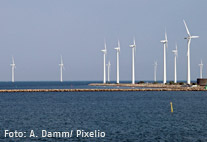CEN and Institute for Coastal Research want to extend their cooperation
27 February 2014, by Ute Kreis

Photo:
On Friday, 25 researchers of both institutions met at the CEN in order to further expand their cooperation and to identify new common objectives ...
The coastal habitat is permanently being exposed to natural and human influences. In common projects, researchers of the Institute for Coastal Research (Institut für Küstenforschung – IfK) and of CEN have already been researching the effects of climate change on these sensitive zones. The research covers scientific as well as social aspects in regional and global contexts. On Friday, 25 researchers of both institutions met at the CEN in order to further expand their cooperation and to identify new common objectives. The fields of environmental chemistry and monitoring offer new potential: How did the coasts change in the past and how will they do so in the future? In order to answer these questions, CEN and IfK scientists investigate – among other aspects – the cycle of natural substances and so-called problematic substances, and analyze microfossils which enable the researchers to reconstruct for example the sea level rise on native coasts.
With an increasing demand for renewable energies, the quest to find suitable land and ocean areas is growing too – for example for wind or solar energy plants. So-called power-generating landscapes, suitable for obtaining energy, also serve as a new base for joint research projects of CEN and IfK. How can coasts successfully be turned into power-generating landscapes? Which factors have to be considered and which conflicts could develop and potentially affect the landscape and natural scenery? Geographers, sociologists, conflict researchers, geologists, soil scientists and biologists discussed these issues at their cooperation meeting. Furthermore, in addition to coastal research, material research can be included within all energy discussions as one of the central aspects at the Helmholtz-Zentrum Geesthacht.
The IfK colleagues displayed great interest in promoting and supporting young talents at the CEN. It was also suggested to integrate professorships of the Helmholtz-Zentrum into the curriculum of the Graduate School of Integrated Climate System Sciences (SICSS) at the CEN, as there has already been established a close relationship within the graduate education. About 15% of the members in the SICSS graduate school carry out their PhD research at the Helmholtz-Zentrum Geesthacht.
